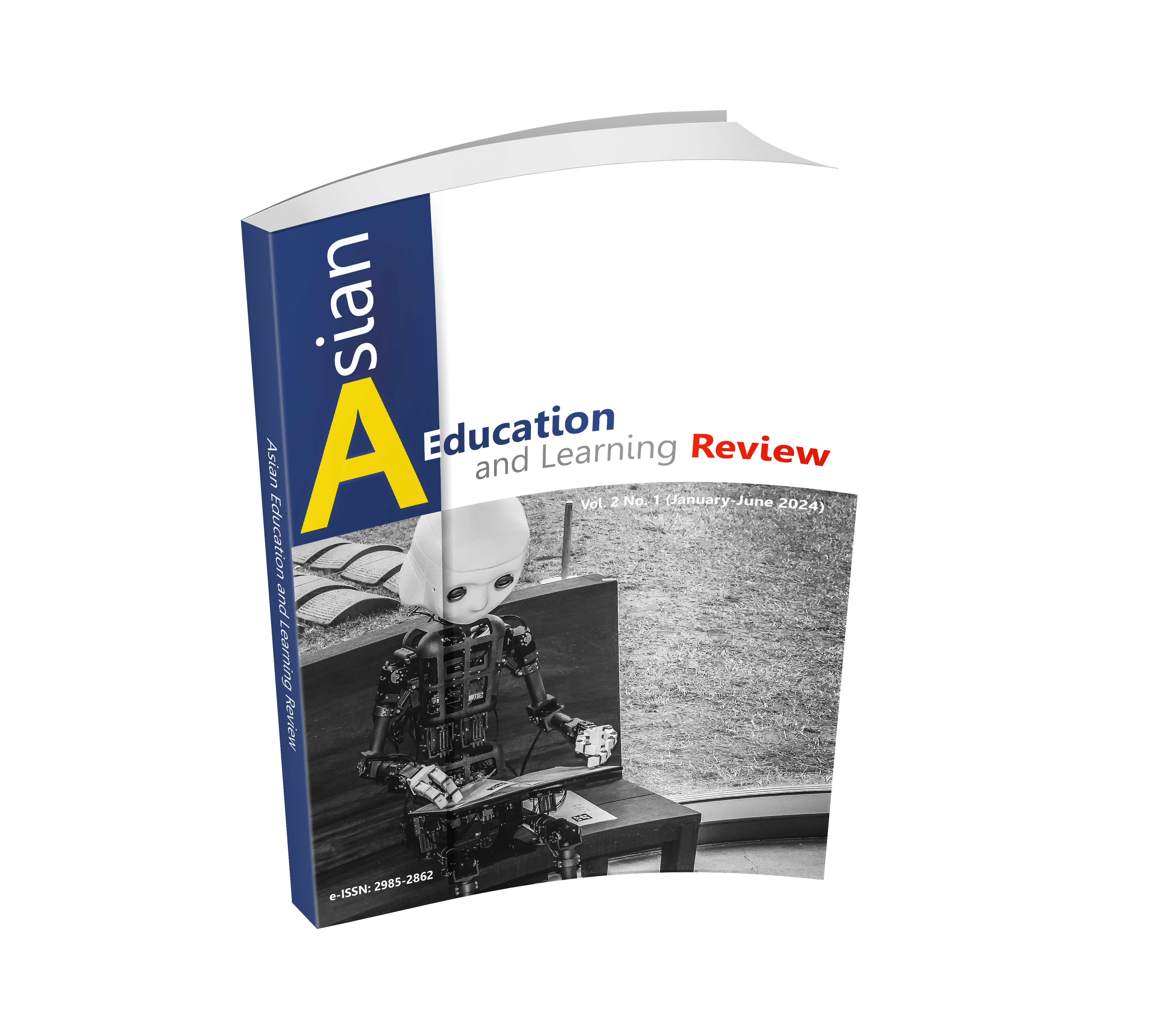THE DEVELOPMENT OF A BLENDED LEARNING MANAGEMENT DIGITAL PLATFORM ON ENTREPRENEURSHIP AND VENTURES IN EDUCATION FOR GRADUATE LEARNER
DOI:
https://doi.org/10.14456/aelr.2024.1Keywords:
Blended Learning, Learning Management System, Digital Platform, Education, Graduate LearnerAbstract
The objectives of this research were to 1) design and create, test, use and evaluate a blended learning management digital platform on Entrepreneurship and Ventures in Education and 2) recommend the evaluated blended learning management digital platform on Entrepreneurship and Ventures in Education for graduate learner. The sample group consisted of 26 graduate students in the Master of Education program at the Rajamangala University of Technology Rattanakosin. Ten experts in ICT systems and educational innovation helped evaluate the constructed blended learning management digital platform. The obtained results indicated: 1) the prototype of a blended learning management digital platform on Entrepreneurship and Ventures in Education for graduate learners uses a database life cycle development process. The experiment with the operational system for graduate learning involves learning via educational technology with a simple implementation. The participating students have a highest level of satisfaction with the system prototype, and 2) This system has a structure consisting of a website, lecturer and student database, knowledge record, knowledge assessment, discussion board, knowledgebase, download documents, related case studies, and pictures and videos of various activities. Therefore, it can be concluded that research and development of a blended learning management digital platform on Entrepreneurship and Ventures in Education produce a desirable performance for graduate learners.
Downloads
References
Adele, B., Ellinger, A., McWhorter, R., & Egan, T. (2023). Exploring learning outcomes for managers who coach. European Journal of Training and Development, 47(5/6), 635-652.
Ayob, H., Daleure, G., Solovieva, N., Minhas, W., & White, T. (2023). The effectiveness of using blended learning teaching and learning strategy to develop students’ performance at higher education. Journal of Applied Research in Higher Education, 15(3), 650-662.
Chandan, K., Kealey, C., Timpson, P., & Murphy, B. (2022). Blended learning model incorporating online learning for a competency-focused, work-based learning (WBL) programme-allied healthcare case-study. Higher Education, Skills and Work-Based Learning, 12(4), 791-806.
Demir, A., Budur, T., Omer, H., & Heshmati, A. (2023). Links between knowledge management and organisational sustainability: Does the ISO 9001 certification have an effect?. Knowledge Management Research & Practice, 21, 183-196.
Garbin, F., Ten Caten, C., & Jesus Pacheco, D. (2022). A capability maturity model for assessment of active learning in higher education. Journal of Applied Research in Higher Education, 14(1), 295-316.
Gioiosa, M., & Kinkela, K. (2022). Assessing the outcomes of an active learning exercise. Journal of Applied Research in Higher Education, 14(4), 1496-1508.
Gómez, C., Hinojo-Lucena, F., Moreno-Vera, J., & Alonso-Garcia, S. (2023). Analysis of a forced blended-learning program in social sciences higher education during the COVID-19 post-pandemic. Education + Training, 65(2), 298-311.
Heart, T., Finklestein, E., & Cohen, M. (2022). Insights from pre Covid-19 perceptions of law students on four learning methods: implications for future design of blended learning. Quality Assurance in Education, 30(1), 32-50.
Hermita, N., Erlisnawati, Alim, J., Putra, Z., Mahartika, I., & Sulistiyo, U. (2024). Hybrid learning, blended learning or face-to-face learning: which one is more effective in remediating misconception?. Quality Assurance in Education, 32(1), 64-78.
Huang, X., & Lai, C. (2020). Connecting formal and informal workplace learning with teacher proactivity: a proactive motivation perspective. Journal of Workplace Learning, 32(6), 437-456.
Ismaili, Y. (2021). Evaluation of students’ attitude toward distance learning during the pandemic (Covid-19): A case study of ELTE university. On the Horizon, 29(1), 17-30.
Laudon, K., & Laudon, J. (2018). Management Information Systems: Managing the Digital Firm. 14th ed. New York: Pearson Education Indochina.
Nayar, B., & Koul, S. (2020). Blended learning in higher education: a transition to experiential classrooms. International Journal of Educational Management, 34(9), 1357-1374.
Onah, D., Pang, E., & Sinclair, J. (2022). Investigating self-regulation in the context of a blended learning computing course. International Journal of Information and Learning Technology, 39(1), 50-69.
Onofrei, G., & Ferry, P. (2020). Reusable learning objects: a blended learning tool in teaching computer-aided design to engineering undergraduates. International Journal of Educational Management, 34(10), 1559-1575.
Oyelude, A. (2022). Blended learning and working options in the aftermath of the COVID-19 pandemic. Library Hi Tech News, 39(3), 1-4.
Panjarattanakorn, D., & Phakamach, P. (2020). The development of a learning management system platform for educational administration theory and innovation. A paper presented at the 4th National Conference on Education 2020, Nakhon Ratchasima, Thailand.
Panjarattanakorn, D., Phakamach, P., Senarith, P., Dolprasit, S., Brahmawong, C., & Wachirawongpaisarn, S. (2023). Practical learning management system combined with case-based learning on educational resource administration in the digital era. RICE Journal of Creative Entrepreneurship and Management, 4(2), 62-77.
Phakamach, P., Senarith, P., & Wachirawongpaisarn, S. (2022). The metaverse in education: The future of immersive teaching & learning. RICE Journal of Creative Entrepreneurship and Management, 3(2), 75-88.
Phakamach, P., Wachirawongpaisarn, S., & Panjarattanakorn, D. (2021). Development of active learning management platform using constructivism on the topic of ICT system and innovation for educational administration at graduation level. Journal of Education and Innovative Learning, 1(3), 219-237.
Raksakul, R., Yamrung, R., & Suthasinobon, K. (2023). HyFlex Learning: The next normal instructional strategies. Journal of Education and Innovative Learning, 3(1), 89-100.
Viebig, C. (2022). Blended learning in entrepreneurship education: a systematic literature review. Education + Training, 64(4), 533-558.
Wang, X., Lin, W., Jiang, Y., Wu, Y., Liu, Y., & Zhou, W. (2021). Active learning and instructor accessibility in online talent training: a field experiment in China during COVID-19. Development and Learning in Organizations, 36(1), 14-16.
Warren, L., Reilly, D., Herdan, A., & Lin, Y. (2021). Self-efficacy, performance and the role of blended learning. Journal of Applied Research in Higher Education, 13(1), 98-111.

Downloads
Published
How to Cite
Issue
Section
License
Copyright (c) 2024 Authors

This work is licensed under a Creative Commons Attribution-NonCommercial-NoDerivatives 4.0 International License.






.png)


